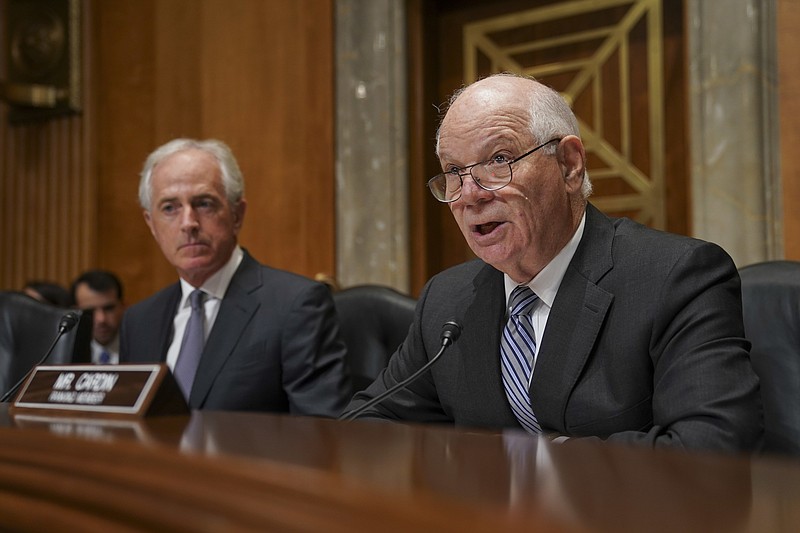The Senate Foreign Relations Committee, led by frequent Trump critic Sen. Bob Corker, held a hearing Tuesday on the president's unchecked authority to use nuclear weapons.
Corker, a Tennessee Republican who is not seeking re-election next year, has pointedly criticized President Donald Trump's stability and competence - in short, his fitness for office - and warned that the president seems to be leading the U.S. on "the path to World War III."
The last time either the Senate Foreign Relations Committee or House Foreign Affairs Committee specifically examined the nuclear authorities issue was in 1976 - 41 years ago. In that time, the lawful controls and protocols continued to make the use of nuclear weapons subject to political control, Corker said.
"This is why no general, or admiral, or defense secretary has the authority to order the use of nuclear weapons. Only the president - the elected political leader of the United States - has this authority," he said.
But there's a bit of ambiguity. Our Constitution says only Congress can declare war.
So talk recently by both President Trump and National Security Adviser Lt. Gen. H.R. McMaster about "preventive war" and suggestions that the U.S. might make a first nuclear strike has Americans and some members of Congress worried.
The hearing Corker convened on Tuesday offered little solace.
In short, according to various testimony from legal, policy and military experts, as well as questions and answers during the two-hour hearing, the decision to use nuclear weapons - first or last - is Trump's and Trump's alone under current law and protocols - many once touted by some of these very senators who hoped to stay out of the debates over past wars and conflicts.
What's more, the military members and advisers are bound by law and tradition to follow a president's order unless they deem it an illegal order. Panel members said it is entirely unclear, however, who would determine legality and how that process would work.
What could possibly go wrong?
Corker insisted the hearing shouldn't be taken as "specific to anyone" (read here Trump), but Trump's name - and his tweeting insults to foreign powers - came up time and time again.
Senators in the hearing made it clear they don't parse the president's authority to respond with nuclear weapons if the U.S. detects a nuclear launch elsewhere in the world. Their concern, they said, was what Trump or any president will use nuclear force preemptively.
"We're dealing with a president who is not willing to accept advice. ... I want the president to act in a way that includes experts and not a series of Twitter posts," said Sen. Jeanne Shaheen, D-N.H.
At the hearing's end, Sen. Ed Markey, D-Mass., put a period and exclamation point on the "realities" of today's situation.
"I think that's what is of most concern to the American people - that no one human being should ever have that power [to launch a preemptive nuclear war]. From my perspective right now, given what Gen. McMaster said there could be plans in place right now in the White House given to the president to launch preemptive war against North Korea using American nuclear weapons without consulting with or informing Congress whatsoever - by aggregating that power to the executive branch in clear violation of the U.S. Constitution."
Several senators mentioned pending legislation to reassert congressional authority, but the experts urged caution. Senators seemed unmoved - especially Markey.
"I don't think we should be trusting the generals to be a check on the president. I don't think we should be trusting a set of protocols to be protecting the American people from having a nuclear war launched on their behalf. I don't think we should be relying on a group of individuals to be resisting an illegal order when they have all been hired by the president to have the jobs they have," Markey said, adding:
"I don't think the assurances I've received today will be satisfying to the American people. I think they can still realize that Donald Trump can launch nuclear codes just as easily as he uses his Twitter account without a check and balance that the United States Congress would be seeking and is constitutionally responsible to exercise."
Corker said after the hearing that he expects Congress to continue to review questions about the president's authority "because it is a sobering issue."
He said he did not see a legislative solution today, "but that doesn't mean that over the course of next several months one might develop."
This hearing - billed by Corker as the first of a series - was historic, and is a very, very big deal.
Let's hope the committee sticks with it.
